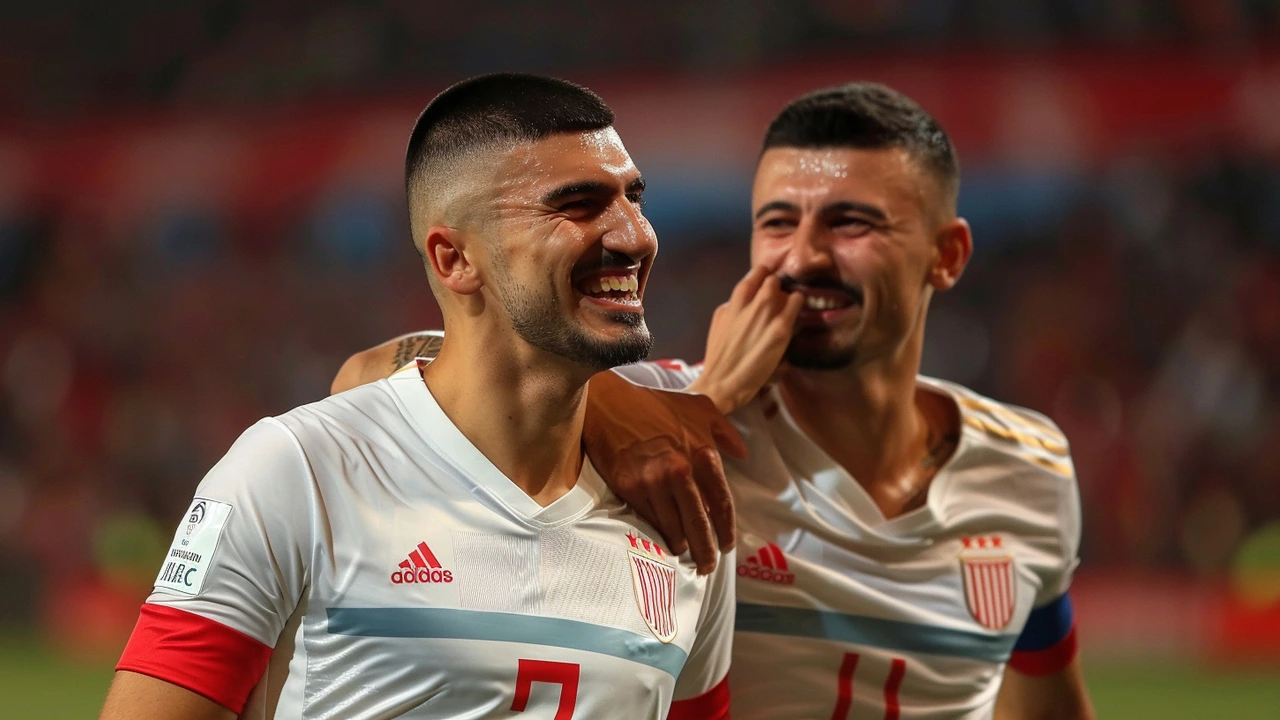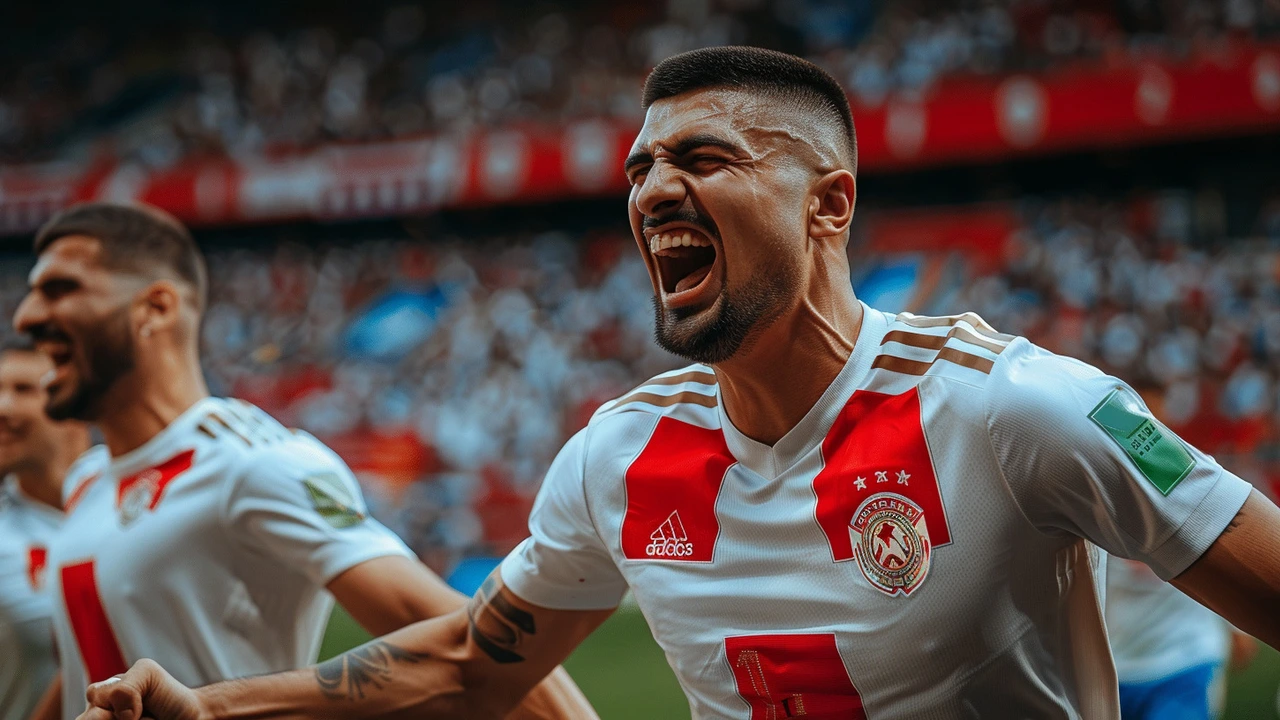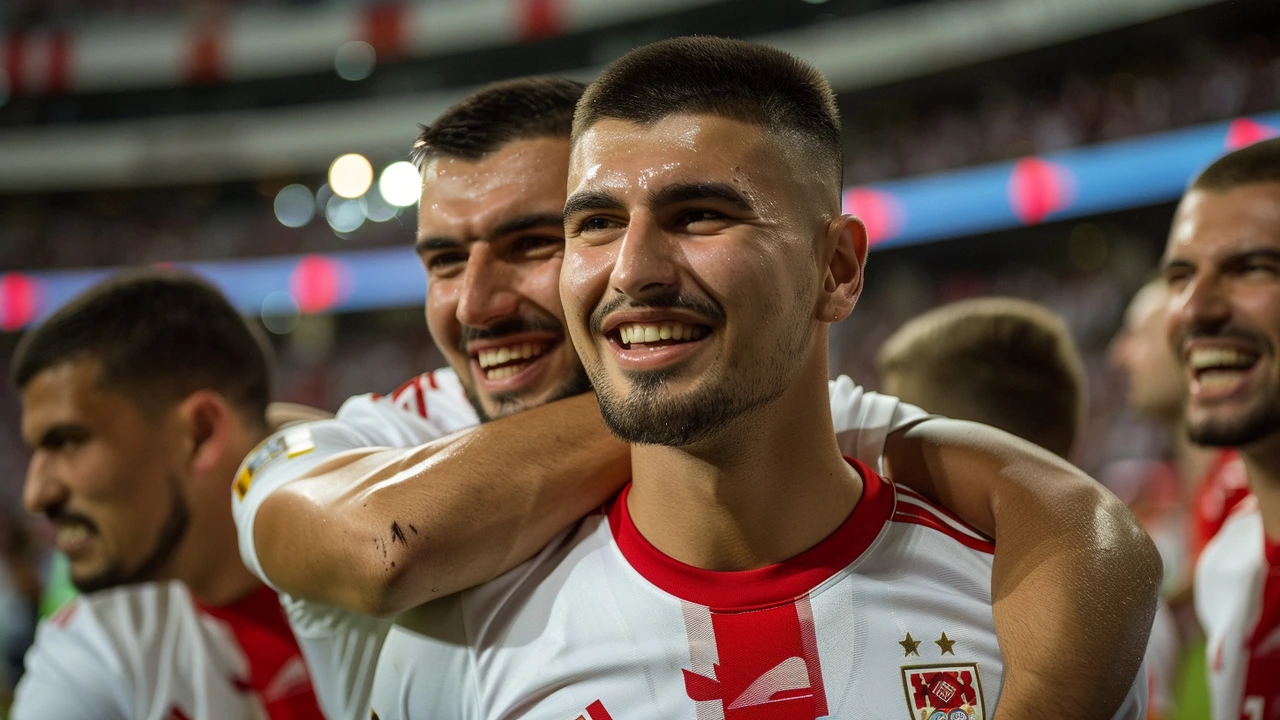Euro 2024: UEFA Investigates Turkey's Star Merih Demiral Over Controversial Celebration
 Jul, 3 2024
Jul, 3 2024
Introduction
UEFA has initiated an investigation into Turkey's Merih Demiral following his controversial goal celebrations during his team's Euro 2024 match against Austria. The defender netted twice in a 2-1 win, securing Turkey's progress to the quarter-finals. However, Demiral's actions post-goal have cast a shadow over the victory, drawing scrutiny from football's governing body for potentially making political gestures.
The Match and Key Performers
Turkey's advancement to the next stage of Euro 2024 came courtesy of two crucial goals by Merih Demiral. Displaying remarkable skill, Demiral struck early, scoring in the 57th second and again in the 59th minute, both times capitalizing on corners delivered by the budding talent, Arda Guler. These pivotal goals not only highlighted Demiral's prowess on the field but also catapulted Guler into the limelight as an assist provider of immense promise.
The match against Austria was fiercely contested, with both teams demonstrating a high level of competitiveness. Despite the early lead, Turkey had to fend off numerous attacks from an aggressive Austrian side. The intensity of the game was palpable, with every play and every move scrutinized under the watchful eyes of the fans and officials alike. However, the tension took a darker turn as the spotlight shifted from the pitch to Demiral’s celebratory actions.
Political Gesture Allegation
Merih Demiral's goal celebrations have sparked a significant controversy. UEFA officials are investigating claims that Demiral made a 'wolf's salute' with each hand after scoring his goals. This gesture is closely associated with Turkish nationalist sentiments and linked to the organization Ulku Ocaklari, also known as the Grey Wolves. The Grey Wolves are a far-right group that has garnered international attention for its political activities. Should the investigation confirm these allegations, Demiral could face sanctions, including a potential ban, which would be a major blow to Turkey's aspirations in the tournament, especially with their looming quarter-final clash against the Netherlands.

On-Field Controversies
Beyond Demiral's actions, the match was marred by several other controversies. Notably, the game witnessed unsavoury crowd behaviour. During the critical moment leading to Demiral's second goal, a cascade of plastic beer cups rained down on Arda Guler as he set up the corner. The young star was momentarily distracted by the unusual disturbance, though he maintained composure and delivered the crucial assist.
In a separate incident, Austria’s Marcel Sabitzer found himself at the receiving end of similar crowd antics. As he prepared to execute a play, Sabitzer was struck by beer cups, one of which seemingly hit him on the head, causing him to fall to the ground. He lay clutching his head, demonstrating the impact and potential harm of such actions. These incidents have raised questions about crowd control and the responsibilities of tournament organizers in ensuring player safety.
Implications for Turkey
The ramifications of the investigation into Demiral's actions are potentially significant for the Turkish team. As they prepare to face the Netherlands in Berlin on Saturday, the uncertainty surrounding Demiral's involvement looms large. His absence, if a ban is imposed, would be a notable handicap for Turkey. Demiral has been a defensive stalwart and a key player contributing not just in defense but also in pivotal moments in attack, as evidenced by his performance against Austria.
The team management and fans are undoubtedly on edge, awaiting UEFA's decision. The unfolding drama off the pitch has certainly overshadowed the team's on-field accomplishments, and there is a palpable sense of tension and anticipation within the Turkish camp. Every player, coach, and supporter knows that Demiral's availability could be the difference between advancing further in the tournament or facing an early exit.
Fan Reactions
Unsurprisingly, the reaction from fans has been polarized. Turkish supporters, while lauding Demiral for his on-field heroics, have expressed mixed emotions regarding the allegations of his political gestures. For many, his actions post-goal are seen as expressions of national pride. However, others acknowledge the sensitive nature of political symbols in sports and the potential repercussions it brings.
On the other hand, fans worldwide have taken to social media platforms, voicing their opinions on the issue. Some have condemned the politicization of football, arguing that sports should remain a neutral ground free from external influences. Others highlight the importance of addressing any form of political gesture in sports to preserve the integrity of the game. The debate continues to rage, reflecting the complex emotions surrounding nationality, politics, and sportsmanship.

UEFA’s Stance on Political Gestures
UEFA has maintained a firm stance on political gestures within football matches, consistently advocating for the game to be free of political connotations. The organization has enacted various regulations to ensure that football remains a unifying platform devoid of divisive elements. Previous instances where players have made political statements or gestures have been met with fines, bans, and other disciplinary actions.
The investigation into Demiral underscores UEFA’s commitment to this principle. By probing into the potential 'wolf's salute,' UEFA aims to reinforce its position against the introduction of political narratives in football. This investigation also serves as a reminder to players and teams about the governing body's expectations and the potential consequences of breaching these guidelines. As the hearing progresses, many are watching closely to see if UEFA will continue with their stern approach or if exceptions might be made considering the circumstances.
Conclusion
The unfolding saga of Merih Demiral’s goal celebration during Turkey's Euro 2024 match against Austria has turned a spotlight on the intersection of sports and politics. With UEFA's investigation ongoing, the stakes are high not just for Demiral but for the entire Turkish squad as they brace for their quarter-final fixture against the Netherlands. As fans and stakeholders alike await the outcome, this incident raises broader questions about the role and regulations of political expressions within the world of football. The story is far from over, with each new development promising to add more layers to an already complex narrative.

Barry Hall
July 3, 2024 AT 20:56Congrats to Demiral, but politics belong off the pitch 🙂
abi rama
July 4, 2024 AT 15:33It's great to see Demiral scoring twice and helping Turkey advance, yet the celebration controversy overshadows the achievement. UEFA's role in keeping sport neutral is understandable. Players sometimes express national pride, but the line gets blurry when symbols have political weight. Hopefully the investigation will be swift and fair.
Megan Riley
July 5, 2024 AT 19:20Well done to the team, especially Demiral!!, his goals were spectacular,,, but the gesture... uh... it raised concerns,,, UEFA must act, and the fans? they’re divided, some love the passion, others worry about the implications... we’ll see what happens... stay tuned!!!
Lester Focke
July 6, 2024 AT 23:06The recent Euro 2024 encounter between Turkey and Austria has inevitably become a case study in the intersection of athletic performance and sociopolitical symbolism.
The double strike by Merih Demiral undeniably secured Turkey's progression to the quarter‑finals, a feat that, in isolation, would warrant unqualified commendation.
Nonetheless, the concomitant gestures he performed after each goal have introduced a contentious layer that demands rigorous scrutiny.
UEFA's regulatory framework explicitly proscribes political expressions within the sporting arena, a principle that has been reinforced by numerous precedents.
The so‑called “wolf's salute” is inextricably linked to extremist factions, thereby transforming a seemingly innocuous celebration into a potential propagandist act.
From a jurisprudential perspective, the governing body is obliged to assess whether the gesture contravenes Article 5 of its Disciplinary Regulations.
Should the investigation substantiate the allegations, the imposed sanctions could range from a financial fine to a multi‑match suspension, each bearing significant tactical repercussions.
Turkey's tactical setup, heavily predicated on Demiral's dual‑role as defender and occasional goal‑scorer, would suffer a palpable deficit without his presence.
Moreover, the psychological impact on the squad, given his leadership aura, cannot be discounted.
Conversely, a punitive measure might serve as a deterrent, reinforcing the apolitical ethos that UEFA strives to preserve.
Critics argue that the enforcement of such regulations risks encroaching upon personal expression, yet the collective integrity of the competition remains paramount.
In the broader context, the incident underscores the delicate balance between national identity and the universal language of sport.
It also provokes a necessary dialogue concerning the responsibilities of athletes as inadvertent ambassadors of their homeland.
The forthcoming quarter‑final against the Netherlands will inevitably be contested under the shadow of this unresolved matter.
Ultimately, the outcome of UEFA's inquiry will set a precedent, either reaffirming the strict prohibition of politicised symbolism or delineating its boundaries within the modern football landscape.
Naveen Kumar Lokanatha
July 8, 2024 AT 02:53The incident with the beer cups on the pitch shows how important crowd management is. Players should be protected from such hazards. UEFA must review security protocols. This also reminds us that the game is about skill, not distractions.
Alastair Moreton
July 9, 2024 AT 06:40Honestly, the whole thing feels like a publicity stunt. Demiral should just focus on scoring and leave the politics at home.
Surya Shrestha
July 10, 2024 AT 10:26While your assessment captures a superficial view, it neglects the nuanced jurisprudential implications, the historical antecedents of politicised gestures, and the regulatory imperatives that UEFA upholds. Moreover, the broader sociocultural resonance of such symbols cannot be dismissed outright.
Rahul kumar
July 11, 2024 AT 14:13Yo, if UEFA tightens the rules they should also step up stadium security, those beer cups are a real hazard. Players need a safe field, and fans need clear guidance on behavior. Simple fixes can keep the focus on football, not drama.